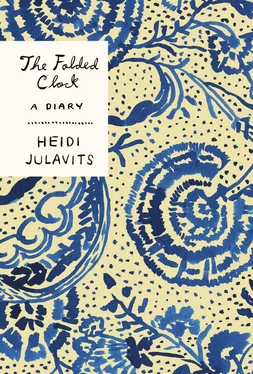Midthirties: I start to get interested less in Edie the life than I am in the structure of Edie the book — the many gossipy voices all talking about Edie (the book is an “oral history,” i.e., a bunch of interviews edited into what appears to be a continuous conversation among many people). I think to myself, Someday I am going to steal this structure .
Around this time I loaned my copy to a good friend. I kept the dust jacket because I didn’t want her to tear it. Ten years later, the dust jacket is all I possess. Acquaintances return books. Friends never do.
Fortunately, at a public reading I gave around the time I last saw my copy of Edie , I mentioned during the Q&A that the book I most treasured was Edie . A woman in the audience e-mailed me the next day. She was a novelist; she’d been asked to write the screenplay to an Edie Sedgwick biopic. She offered to hook me up with the director in case I might want to write the screenplay in her stead. I didn’t want to write it, but I did want to meet the director. The director had known Edie in her worst days; he’d been criticized (by some) for taking advantage of her at her most pathetic and putting the sad spectacle on film. Also I was about to spend a month in L.A., where the director now lived. I contacted him. I told him I was very interested in his project. Hollywood, in my scant experience, is an industry consisting of projects — defined similarly to the way Mainers define projects. Passionate enthusiasm and commitment is expressed in the name of negligible material results. Twelve years after buying the lumber for his porch project, my neighbor still hasn’t built his porch. After a while the lack of a porch is not a daily reminder of what should be but of what might be . It’s a form of promise. What’s to hope for once the porch is built?
We arranged to meet at the director’s house to talk about the screenplay. He lived in the suburban-seeming flatlands of L.A., his house hard to discern behind the bamboo forest overtaking the property. The roots were slowly upending his foundation like a tooth under a tooth. The floors, because of this slow incursion from below, pitched up and down, and walking through the house I felt like someone trying to reach an airplane bathroom during a turbulent flight. The director was a fanatical collector not just of movie posters and movie memorabilia but also of American bulldogs. One very old, incontinent bulldog had been urinating throughout the house (and presumably other bulldogs before him), and the whole place, windows darkened by the thick stalks of the jumbo bamboo, stank historically. The house extended like a tunnel to an even more lightless inner chamber where his videotapes were kept.
The director was, I think it is fair to say, a man who had not received all that life had, at one time, promised him. I can’t explain, even after knowing and meeting him, why. He was charming and generous and alarmingly smart. He possessed in his head an archive of American culture spanning decades. I suppose, yes, he was a little overwhelming when generously sharing his enthusiasms, and maybe, even in a process town, a bit too enamored of process. But he knew everyone who was anyone from the ’60s, ’70s, and ’80s. He had proof of everyone.
What I mean by proof. Among his many interests were Kung Fu films. In the ’80s he’d obtained the rights to a popular Chinese series and, with the help of a partner, reedited two episodes into a single film with an English-language sound track. This movie was very influential. Around the time when I met the director, he’d recently been contacted by a young and very famous auteur for permission to use a clip from his reedited Kung Fu movie. The director was thrilled. He’d wanted to meet the auteur for years. He told the auteur that he had footage of Uma Thurman’s mother breast-feeding Uma Thurman’s brother. His thinking: the auteur was obsessed with Uma Thurman. Imagine what an opportunity this presented! To see footage of the naked breasts that had nursed Uma Thurman! He told the auteur that he could see this footage if he came to his house. Then the director would sign the papers and give him the permission he wanted.
This is, I think, give or take, what eventually happened.
The director and I spent a lot of time together that month I lived in L.A., though we barely talked about the screenplay. Maybe he didn’t want to make the movie any more than I wanted to write the script for it. One day we hung out with a deranged actress he thought might be good for the part of Edie; she wore a Mexican sundress and talked for uninterrupted hours about herself, though not one detail of her life do I retain. Often the director told me stories about the talented people and the untalented people. And about those who’d made it and those who hadn’t. He was outraged on behalf of certain geniuses who had never gotten their due. He never once expressed bitterness on his own behalf, but I suspect the director believed, and I believed it too, that he’d been unfairly deprived of opportunity and greatness. Far stupider people had succeeded where he had not.
At this time, I had not yet read the Goncourts. Only today did I read the following page from their journals because I am giving these brothers, these viperous, sulky brothers, a second chance:
If I were really wealthy, I should have enjoyed making a collection of all the muck that celebrities with no talent have turned out. I should get the worst picture, the worst statue of this man and that, and pay their weight in gold. I should hand this collection over to the admiration of the middle classes, and after having enjoyed their stupid amazement at the tickets and the high prices of the objects, I should let myself go off into criticism composed of gall, science, and taste, until I foamed at the mouth .
Were the director and I still in contact, I might send him this quote. We’re not. Promise has a shelf life. Without ever stating as much, we both knew he was never making this movie about Edie. But he was not as close to her life as I would get. A few weeks after meeting the director, my friend’s husband, also an Edie fanatic, suggested we drive a few hours north to Santa Barbara and visit the ranch where Edie grew up. We chose not to worry ourselves that the ranch had been donated, by the Duke Fuzzy Sedgwick estate, to the nearby university for agricultural experiments, and was surrounded by a fence. We parked on the roadside. We ignored the NO TRESPASSING signs. We pried ourselves through the gate. We hiked down to the house, we looked into all the windows, we saw the fireplace where the Sedgwick family photograph with Fuzzy reading a book to his many (not yet suicided or motorcycle-killed or overdosed) children, was taken. Then we got busted by the caretaker. He gave us hell. We apologized, and he offered to show us around. He didn’t understand what we were there to see, however. We were not there to see how nonnative grasses behave when planted in Southern California. We were not there to see how formerly extinct varieties behave when reintroduced to their homeland. We were there to understand why the native promise of this one woman, it had long ago been proven, did not survive.
Today I went to a barbeque wearing a hospital bracelet. I’d gone to the ER a few days earlier to get antibiotics for a case of strep throat. Normally strep throat does not require a visit to the emergency room, but we are in Maine, and we don’t live here full-time, and the doctors here aren’t accepting new patients, and my doctor in New York refused to phone in antibiotics without examining me, and so I had to go to the ER.
I’d been to this ER eight years ago. All of my information dated back to that time — my old address, my old insurance, my old doctor in New York. My old doctor’s name was on the bracelet they taped around my wrist; on my discharge papers, it was suggested that I follow up with my old doctor once I returned home. Unfortunately, my old doctor was dead. He was killed riding his bike in Manhattan about six years ago. He was a beloved family physician of the sort that is not bred any longer, and thus his demise was newsworthy, inspiring many articles in the papers. In New York his tragedy had been well documented and long ago accepted. Not so here.
Читать дальше












